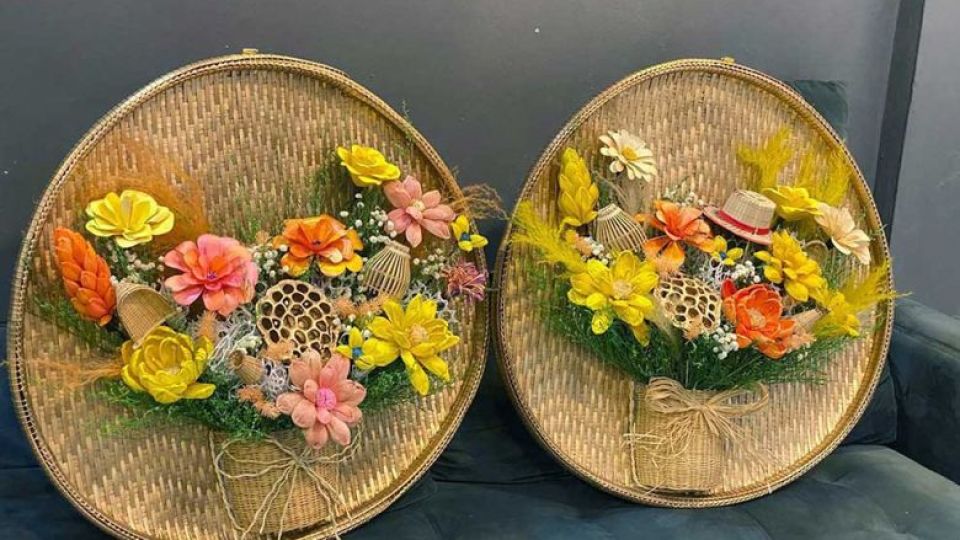October 14, 2022
PHNOM PENH – ‘When you look at these flowers, they appear simple. But what you do not realise is the many stages of decoration they have passed through before becoming so beautiful. We can only make flowers this natural if we are happy ourselves. If we are unhappy, the flowers we make reflect that,” said Vong Heranhniyuth, a manufacturer of exquisite artificial flowers.
Heranhniyuth uses corn husks, cornflowers, grass and palm leaves to make his creations – branded “Phka Khmer” (Khmer Flowers) – and sells them from his shop on Street 143, Boeung Keng Kang III commune, Chamkarmon district, Phnom Penh.
As he works, the corn husks appear dry and lifeless, devoid of colour, but as the finished products begin to emerge, their beauty appears.
At the age of 33, he explained that he is in fact a civil servant in a state institution, but created the small business to supplement his government income.
A previous business did not survive the economic downturn caused by Covid-19, but one day he saw a social media post by a friend who was making artificial flowers. He was impressed, and resolved to learn how it was done. He already had a passion for making paper flowers, so once he had learned the trick of drying the corn husks just so, he was able to begin making his beautiful products.
He began posting pictures of his flowers on social media and was surprised to receive many inquiries from people wanting to order from him. Recognising the obvious opportunity, he recruited more than ten friends to work on the project, and began to sell more and more flowers.
“At first we posted some pictures on social media, and several people asked if they could buy them. When they came to see the flowers at my shop, the overwhelming response was that they are beautiful and very natural looking. Naturally, this was provided encouragement for me and my friends to keep working on them,” he said.
The flowers are made from everyday items that most people see as worthless. Common grass, for example, he said, can be dried so it does not crumble but still retains its original form.
Heranhniyuth explained that the first thing he has to do is take a clean inner husk of corn – without soil stains – and then wash it, boil it and dry it out. If they are not dry enough, the finished product may grow mould.
There is a trick to this, he said, because if it is too dry, it will not look good. Therefore, he said, they must find the right balance between it being too dry and too damp.
He will paint flowers to order for customers, but generally the colours he offers are blue, pink, yellow, red, light green and purple.
He makes beautiful replicas of sunflowers, roses, lilies, orchids and water hyacinths, among others. In total, his shop offers about ten types of flowers, most of which are made from corn husks and palm leaves. Grass and palm leaves are generally used as a decorative flourish to his bouquets. It takes five days to a week to prepare the base husks for their transformation.
He added that he has been producing artificial flowers for almost two years, and they are gaining popularity. The steady growth of trade means he no longer concerned with finding a market for his goods.
Most of his customers purchase them for use at the opening of new businesses and housewarming ceremonies, or other special occasions, generally in Phnom Penh. The price of a bouquet can vary from $10 to $200 dollars.
He has expanded his manufacturing capacity by training the villagers of Tnaot Chum, Tram Kak district, Takeo province. He taught them to dry the corn husks and dye the flowers, and if they are up to his standards, he will buy the final products from them, thus helping them by providing an extra source of income.
“My only real concern is that some people are unaware of my products. Once they see the beauty of them, nearly everyone is a convert. Like plastic flowers, they can be stored for a long time and displayed when they are needed. Unlike plastic flowers, they are made by hand right here in the Kingdom,” he said.
He is pleased that his business is making a small contribution to environmental awareness by recycling what most people consider waste products into luxurious decorative products.
He also said that as demand grows, he intend to expand into several provinces.
He appealed to the public to examine his products and compare them to the imported plastic alternative, saying that he believed people would be impressed.
Additional orders would also mean he could employ more members of his community, providing societal benefits to the people of Cambodia.


